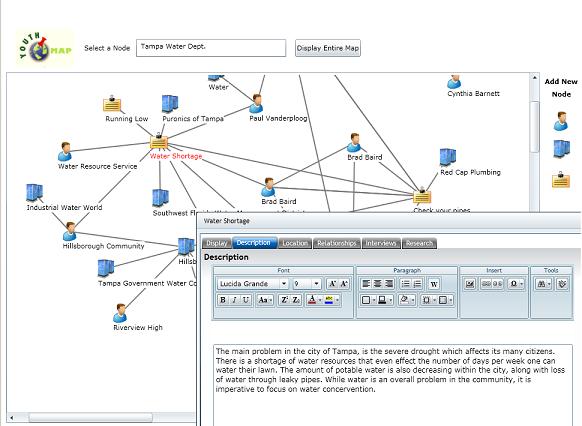« creating informed communities (part 3) | Main | creating informed communities (part 5) »
May 13, 2010
creating informed communities (part 4)
This is the fourth of five strategies proposed to achieve the goals of the Knight Commission on the Information Needs of Communities. See Monday's post for an overview.
Strategy 4: Generate Public "Relational" Knowledge
Citizens need facts about organizations, leaders, and issues. They need rival interpretations of those facts, and deliberative public judgments based on such interpretations. Citizens also need to understand the relationships among people, organizations, and issues. All competent civic and political actors, since the beginning of time, have held in their heads implicit "network maps" that link ideas and individuals in their community. They know, for example, that if they want to talk to the leader of the town, they should go through an accessible individual whom the leader regularly consults. If someone raises a local issue, they can link it to relevant organizations and to related issues.
In recent years, three developments have underlined the importance of such thinking. One is the "The New Science of Networks," as Albert-László Barabás subtitles his book Linked. This science is the mathematical exploration of nodes and network ties as they arise under various conditions, and it has yielded powerful insights, such as the value of "weak ties" and the importance of individuals who connect disparate communities.
The second development is the enormous popularity of social networking sites like Facebook, which are driven by webs of relationships. These sites have popularized the concept of network ties and underlined their importance. But Facebook and other corporate social networks keep the relational data--the "network map"--to themselves. They do so to protect users' privacy and also to give themselves a valuable asset. For example, to reach everyone at Tufts who has a Facebook account, we must pay Facebook to advertise. We cannot see a list of users who have Tufts connections.
The third development is the art of relational organizing. Relational organization groups such as the Industrial Areas Foundation and the PICO and Gamaliel Networks do not begin with clear and fixed goals. They decide what their causes should be by means of long periods of listening and discussing within diverse networks that they carefully nurture. They are highly skilled at mapping networks to identify power relationships, excluded groups, and key hubs. [See, e g., Mark R. Warren, Dry Bones Rattling: Community Building to Revitalize American Democracy (Princeton: Princeton University Press, 2001, pp. 31-2..
The next step is to democratize the possession of effective network maps, so that they do not exist only in the brains of skilled organizers or on the servers of Facebook and MySpace. Informed communities should have access not only to discrete facts and lists of organizations--nor should they be satisfied with geographical maps that show the physical location of organizations. They should be able to build and consult public network maps that allow them to identify power, influence, exclusion, division, and other attributes of relationships, not of individuals.
Working with Lew Friedland and his colleagues at Community Knowledge Base, we have been experimenting with public network maps in two contexts:
- We have begun to create computer-based games in which classes of high school or middle school students quickly generate network maps of local issues, organizations, and people. The following is part of a real map concerned with water issues in the Tampa, Florida area. It was quickly created by a class of 9th graders, who pooled their knowledge to produce a sophisticated understanding. (One node is open to reveal notes the student has typed.)
- We are also in the midst of creating an open network for the Boston metro area in which nodes will be organizations or issues, and anyone will be able to add to the map, use it to recruit volunteers, and navigate it to explore the structure of this region's civil society. It's not ready for a public launch, but one can explore the map here.
These are just preliminary experiments. They do not yet harness the full potential of network analysis and visualization, nor the power of computers to harvest network data automatically from websites. My basic recommendation is that governments and foundations should invest in providing transparent relational data along with the other information that is already online.
May 13, 2010 10:23 AM | category: Internet and public issues | Comments
Comments
nonePost a comment
Thanks for signing in, . Now you can comment. (sign out)
(If you haven't left a comment here before, you may need to be approved by the site owner before your comment will appear. Until then, it won't appear on the entry. Thanks for waiting.)